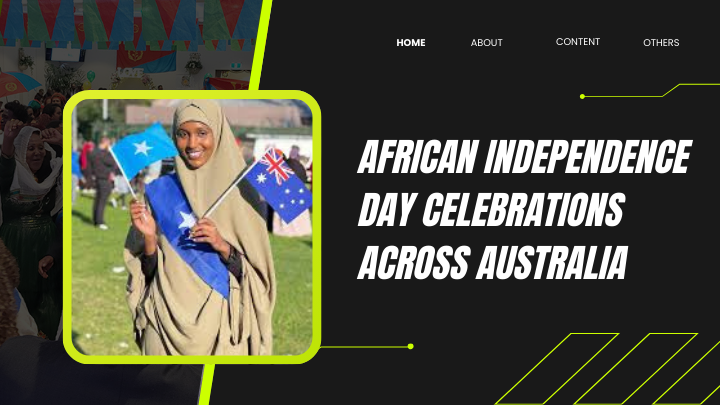African Independence Day Celebrations
African Independence Day celebrations hold immense significance, not just in African countries but also within the African diaspora around the world. These commemorations mark the momentous day when African nations gained their independence from colonial rule, and they serve as a powerful reminder of the struggles, resilience, and cultural pride of African people. In Australia, where African communities are thriving and growing, these independence day celebrations offer a unique opportunity to reflect on history, showcase diverse cultures, and bring communities together. Festivals celebrating African Independence Day in Australia are vibrant, lively, and rich in history, with vendors playing a pivotal role in enriching the experience through food, crafts, music, and more.
1. The Importance of African Independence Days
Each African nation’s Independence Day represents a different chapter in the continent’s colonial history, from the struggle for freedom to the triumph of sovereignty. These celebrations honor the bravery of those who fought for independence and continue to inspire pride in future generations. African Independence Day festivals in Australia aim to bring these historical moments to life, creating a space where people can come together to celebrate African culture, reflect on the progress made, and consider the challenges still faced by many African nations.
While each country celebrates on a different day depending on its independence date, the African community in Australia often comes together for these celebrations, with many festivals incorporating elements from multiple nations to reflect the continent's diverse culture and history.
2. Celebrating African Independence Days Across Australia
Various cities across Australia host African Independence Day festivals, each one bringing together diverse communities to commemorate the freedom, unity, and culture of African nations. These festivals celebrate not only the victories of the past but also the contemporary achievements and contributions of African communities in Australia.
Sydney: Sydney is home to one of the largest and most vibrant African communities in Australia. Every year, African Independence Day celebrations in the city feature a wide range of activities, including music performances, cultural exhibitions, and dance. The Africa Day Festival, held in May, often marks the collective celebration of multiple African nations’ independence days. Sydney’s festival atmosphere includes street parades, art displays, and live performances by local and international artists.
Melbourne: Melbourne’s African Independence Day celebrations are similarly dynamic, with community gatherings and cultural showcases taking place across the city. The African Music and Cultural Festival typically coincides with the broader celebrations of African Independence Day, with local artists performing a mix of traditional and contemporary African music. Vendors play a huge part in this festival by providing delicious African foods, crafts, and goods that reflect the continent’s rich diversity.
Brisbane: Brisbane’s African Cultural Festival is another event where independence is celebrated. This festival highlights the resilience of African nations through storytelling, cultural displays, and musical performances. Family-friendly activities are common, and the festival offers an educational experience for attendees, especially younger generations, who can learn about the historical significance of African independence.
Adelaide and Perth: Both cities feature smaller yet vibrant celebrations, where African communities come together to honor their heritage and the importance of independence. From performances of traditional dance to food markets offering African cuisine, these events are about coming together as a community to reflect on their shared history while fostering a sense of pride in their cultural identities.
3. The Role of Vendors in African Independence Day Celebrations
Vendors are a key component of any African Independence Day celebration in Australia. They not only offer festivalgoers a chance to purchase unique items but also provide a window into the diverse cultures and traditions of Africa. At these events, vendors typically sell a range of goods, from traditional African foods to handmade crafts, clothing, and jewelry, all of which play an essential role in showcasing African heritage.
Food Vendors: A Taste of Africa
African festivals are synonymous with delicious food, and vendors offering a variety of African dishes are always a highlight. These foods represent different regions of the continent, giving attendees the opportunity to taste authentic African cuisine, from spicy Nigerian jollof rice and Senegalese yassa to the flavors of Ethiopian injera and South African biltong. Food vendors are an essential part of the celebration, offering festivalgoers a chance to enjoy traditional dishes that might be difficult to find elsewhere.
For many attendees, trying these dishes is more than just about food—it's an opportunity to connect with their cultural roots or experience African cuisine for the first time. Additionally, food vendors often use their stalls to educate visitors about the history and significance of various dishes, making it a truly immersive experience.
Craft and Art Vendors: A Showcase of African Creativity
The diversity of African cultures is reflected in the vibrant handmade crafts available at African Independence Day festivals. Vendors sell a range of items, from intricately carved wooden sculptures and masks to beaded jewelry, handwoven textiles, and colorful clothing. Each item carries its own story, often linked to the region from which it originates. These crafts are not just beautiful souvenirs but also symbols of African creativity and cultural expression.
Many of the items available for sale are crafted using traditional methods passed down through generations, ensuring that festivalgoers are getting a truly authentic piece of African artistry. For example, visitors might purchase hand-painted African prints, traditional beadwork from South Africa, or brightly colored Kente cloth from Ghana. These items not only allow visitors to take a piece of Africa home but also support local artisans and promote fair trade practices.
Cultural Products and Beauty Items
African Independence Day festivals also provide an opportunity to shop for natural beauty products, oils, and wellness goods. Shea butter, baobab oil, and African black soap are just a few examples of popular products sold at vendor stalls. These products, often made from indigenous African ingredients, are prized for their natural healing and moisturizing properties. Vendors offering these goods often educate festivalgoers on their uses and the cultural significance behind them, ensuring that these products are appreciated for both their practical benefits and cultural value.
Additionally, cultural books, music, and films are often available for purchase, giving attendees a chance to explore African literature, music, and cinema while supporting independent African authors and filmmakers.
4. Promoting Unity and Cultural Exchange
Beyond the shopping experience, the vendors at African Independence Day festivals play an important role in promoting unity and cultural exchange. These events foster a sense of community among attendees, whether they are of African descent or simply interested in learning about African culture. By supporting African artisans, food vendors, and small businesses, festivalgoers contribute to the sustainability of African culture in Australia, while also fostering an appreciation for the continent’s diversity.
The multicultural nature of Australia makes these festivals even more special, as they bring together people from various backgrounds who come together to celebrate African history and culture. The marketplace at these festivals becomes a space of cultural exchange, where different ideas, experiences, and traditions are shared, making it not just a celebration of independence, but also a celebration of diversity and solidarity.
African Independence Day celebrations across Australia offer a powerful reminder of the continent’s rich history, struggle, and triumph. These events honor the freedom that African nations fought so hard to achieve while also showcasing the vibrant cultures that make up the African diaspora. With vendors playing a pivotal role in creating a dynamic, interactive shopping experience, these festivals are not just about remembering the past—they are about celebrating the ongoing legacy of African heritage and creativity. Whether you’re tasting authentic African food, buying handcrafted goods, or learning about African history, these market days provide a unique and enriching way to connect with the heart of Africa right here in Australia.



